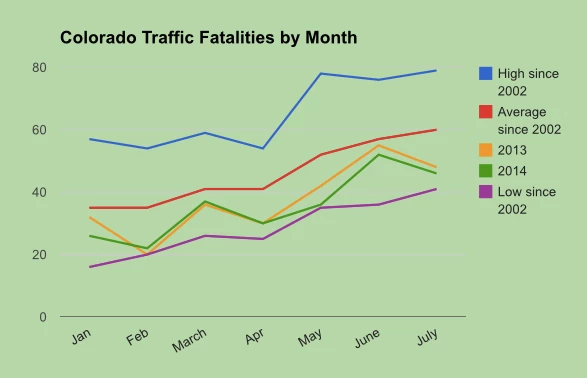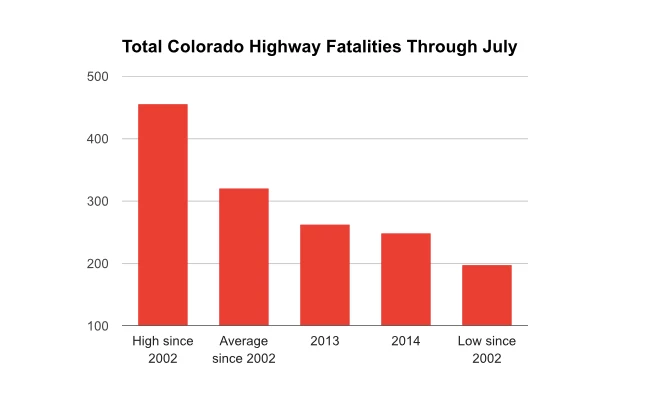Colorado has Had Record Lows in Traffic Fatalities Since Marijuana was Legalized

By:
People who oppose marijuana have pointed to a lot of questionable theories to justify their opposition, arguing, for example, that the substance will deplete the country's productivity as stoners overrun the American workforce. One of the most common arguments against legalization is that it will lead to an epidemic of "drugged driving." On the surface, this seems like a legitimate concern—after all, the more adults smoking pot, the greater the risk that some of those adults will operate a motor vehicle while high, right? Well, it's not that simple.
"Drugged driving" tests are flawed.
The "drugged driving" fearmongering campaign is fundamentally flawed: it does not rely upon any legitimate evidence to support its claim that the trend exists. Reports suggesting that more people have been caught driving while stoned—since states legalized marijuana—are based on statistics that fail to provide accurate information about the number of people who were actively high when they were tested. The only tests that law enforcement have available to screen for "drugged drivers" can only determine whether or not you have marijuana in your system, not if you are currently stoned.
That is distinctly different from tests such as breathalyzers, which can determine the blood alcohol content of a person suspected of drunk driving with proven precision. When you have alcohol in your blood, that serves as an accurate reflection of one's level of intoxication.
For marijuana, on the other hand, the current tests that we have can only determine the presence of marijuana metabolites, which can stay in your system for weeks, depending upon how your body metabolizes drugs.
"It makes sense that loosening restrictions on pot would result in a higher percentage of drivers involved in fatal traffic accidents having smoked the drug at some point over the past few days or weeks," the Washington Post reported. "You’d also expect to find that a higher percentage of churchgoers, good Samaritans, and soup kitchen volunteers would have pot in their system. You’d expect a similar result among any large sampling of people. This doesn’t necessarily mean that marijuana caused or was even a contributing factor to accidents, traffic violations or fatalities."
That doesn't mean driving while stoned is safe.
To be sure, this is not to minimize the argument that driving while stoned poses a problem. It would presumably help the legalization movement's case if law enforcement had a means of measuring a DUI suspect's highness, or however you want to describe it, because people who smoke pot are not necessarily against driving restrictions. Just like alcohol and prescription drugs, driving while under the influence of a known intoxicant, which marijuana is, is not advisable and should be punishable by law.
Colorado traffic fatalities are at a historic low.
But the current figures on the rising number of "drug drivers" being advanced by marijuana prohibition groups is simply fearmongering. It does not discern between people who were actively high and those who had smoked the other week when tested. That is a problem. But another problem with these figures is that in Colorado—where marijuana was legalized for recreational use in 2012—the number of traffic fatalities is at a historic low.
 The Washington Post - washingtonpost.com
The Washington Post - washingtonpost.com
As you can see from this graph, traffic fatalities are down from this year and from the the 13-year average, showing that despite widespread marijuana use in the state, the roadways do not appear any less safe. In fact, "the totals so far in 2014 are closer to the safest composite year since 2002 than to the average year since 2002," according to the Washington Post.
 The Washington Post - washingtonpost.com
The Washington Post - washingtonpost.com
The Washington Post continues:
"If we were to calculate these figures as a rate—say, miles driven per fatality—the drop would be starker, both for this year and since Colorado legalized medical marijuana in 2001. While the number of miles Americans drive annually has leveled off nationally since the mid-2000s, the number of total miles traveled continues to go up in Colorado. If we were to measure by rate, then, the state would be at lows unseen in decades."
So here's an alternative theory for you: what if marijuana legalization actually makes the streets safer? Just as less people die from prescription pain killer overdoses in states where marijuana is legal, what if people are choosing pot over alcohol and not driving under the influence as frequently? I've seen this argument advanced online in various marijuana forums, however, science has not weighed in yet.
Regardless, it is important to come up with tests that effectively determine who is too high to be driving. It is important for the legalization movement, just as it is important for the overall safety of our roads. Until then, however, take reports of increased "drugged driving" incidents with a grain of salt. Not everyone who has marijuana in their system is high, so let's not pretend that they are by suggesting that these tests mean more than what they do.
